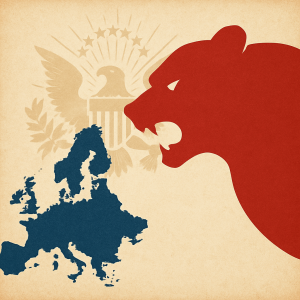Both at home and in the diaspora, they are feeling around and searching. In other words, the Russian opposition is still a long way from forming one single opposition with common objectives and a common programme, but in Berlin a short while ago, in Paris last week and in the European Parliament on 5 and 6 June, their meetings are multiplying and their convergences are getting more and more pronounced because they are now all convinced that they will have to define the “post-Putinism”.
Some believe that the deadline is close. Others are counting in years rather than months, but none of them is giving this regime long because a dictator who loses a war also loses power, and not to win, for Vladimir Putin, meant to get bogged down, as we are seeing happening, and soon to lose. This man, they think, is virtually finished, and in reality, if he wasn’t, Yevgeny Prigozhin wouldn’t be daring to announce a ‘revolution’ in Russia, the sentences handed down to those who denounce the war from within wouldn’t be so implausibly heavy, and there wouldn’t be so many business executives committing “suicide”, pushed into the void after killing their wives and children.
Russian power is crumbling and, for its opponents, the task is threefold. They must find allies within the ruling class, lay the foundations for a future modus vivendi between the Russian Federation and the European Union, and create hope for peace, well-being and freedom in Russian society.
The first of these objectives is the most urgent of the three, because for the Russians and the whole continent, it is essential that the exit from autocracy is achieved without violence. The most realist-thinking people of the two pillars of this regime, the security forces and the wealthy, must be convinced that they would have nothing to lose by facilitating a transition to democracy.
Many of them know that Vladimir Putin is leading Russia into a catastrophe that could quickly result in the break-up of the Federation and its 89 republics, territories and regions. These men know that a turning point needs to be prepared but, not even mentioning the fear that muzzles them, they cannot see any interlocutors with whom to lay the foundations of a post-Putinism and thus avoid a long and bloody plunge into anarchy.
Russia’s opponents need to talk to them, and to do so they need to remember the intelligence with which the Spanish democrats accepted that a wing of Franco’s regime should pave the way out of fascism and into free elections. The Spanish transition was so successful that the Polish opposition was inspired by it under the leadership of Adam Michnik, and it is from these two precedents that the Russian democrats could now draw inspiration.
The second imperative is that the Russian opposition should at the same time engage in dialogue with the countries of the European Union on the conditions for military, economic and political stabilisation of the continent. It is vital that it does so, as it will need to obtain the support of the EU when it comes to power just as much as it will need to convince all Russians now that they have nothing to fear from the EU or NATO.
The opposition will not be able to open this dialogue with the European capitals, which will not want to appear to be working towards a change of regime in Moscow, but it can initiate it with the European Parliament. All it would have to do is respond to the “Address to the Russian people” co-signed a year ago by the presidents of five of the Parliament’s political groups.
This text, in which the European representatives extended a hand not to Vladimir Putin but to Russia, is awaiting a response. The time has come for the democratic opposition to respond, and when it does, in dialogue with the Members of the European Parliament, the opposition will become a rising force, a key player on the European stage. Its opportunities for contact with the less blind fringe of the ruling elites will be increased and all that will then be left for the Russian democrats to do is to propose, as the French National Council of the Resistance did, a common programme to their fellow citizens.
This short, reformist text would have a formidable political impact if it were based on three key ideas: freedoms and democracy, the autonomy of the 89 constituent entities of the Federation and social equity based on a renewal of public services and state arbitration between employers and employees.



